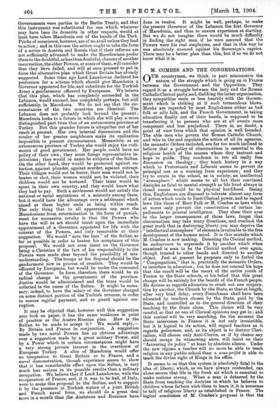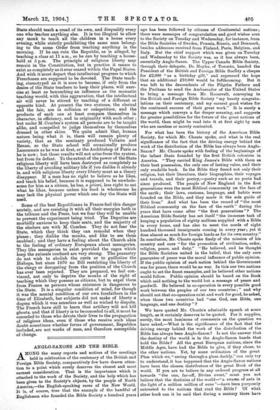M. COMBES AND THE CONGREGATIONS.
OUR countrymen, we think, in part misconceive the nature of the struggle which is going on in France between the Government and the Opposition. They regard it as a struggle between the laity and the Roman Catholic Clerical party, and, disliking the latter organisation, they sympathise more or less heartily with the Govern- ment which is striking at it such tremendous blows. Monks are regarded by most Englishmen either as bad folk or silly folk, and the French Government, in taking education finally out of their hands, is supposed to be transferring it to persons who are at all events more competent and less prejudiced. There is, no doubt, a point of view from which that opinion is well founded. The able men who govern the Roman Catholic Church, and who in the end regulate the action of all its agencies, the monastic Orders included, are far too much inclined to believe that a policy of obscurantism is essential to the religious health of the masses whom they instruct and hope to guide. They condemn in tato all really free discussion on theology ; they teach history in a way which to Protestants and Liberals seems to pervert its principal use as a warning from experience ; and they try to create in the school, as in society, an intellectual " atmosphere " which seems to all but their convinced disciples as fatal to mental strength as life lived always in closed rooms would be to physical hardihood. Seeing this, Englishmen are disposed to tolerate almost any form of action which tends to limit Clerical power, and to regard laws like those of Herr Falk or M. Combos as laws which at worst only prevent the consecration of certain im- pediments to general intelligence. They close their eyes to the larger consequences of those laws, forget that obscurantism may take many directions, and overlook the great truth that in destroying liberty you may deprive the "intellectual atmosphere" of elements invaluable to the free development of the human mind. It is this mistake which M. Combes is now making. Detesting the Clerical method, he endeavours to supersede it by another which when examined is seen to be the Clerical method over again, though trusted to other hands and directed to another object. Just at present he proposes only to forbid the "Congregations," that is, practically the monastic Orders, to interfere in education ; but he does not conceal his hope that the result will be the resort of the entire youth of France to the State schools, or his belief that this great change will be entirely for the benefit of the French people. He desires as regards education to crush out one corpora- tion by another, the Church by the State, so that at length, after very brief delay, every Frenchman shall have been educated by teachers chosen by the State, paid by the State, and controlled as to the general direction of their teaching by the State alone. This choice will be very careful, so that no one of Clerical opinions may get in ; and this control will be very searching, for the moment the State intervenes in France it is not only irresistible, but it is logical in its action, will regard teachers as it regards policemen, and, as its object is to destroy Cleri- calism, will choose only Anti-Clerics, or if by chance any should escape its winnowing sieve, will insist on their "favouring its policy" at least by absolute silence. Under the new regime a teacher will no more be able to teach religion in any public school than a sous-prefet is able to teach the divine right of Kings in his office.
It seems to us that this system is absolutely fatal to the idea of liberty, which, as we have always contended, can alone secure that life in the fresh air which is essential to make nations strong. When a man is debarred by the State from teaching the doctrine in which he believes to children whose fathers wish them to learn it, it is nonsense to talk of religious liberty as established in France. The logical conclusion of M. Combes's proposal is that the State should teach a creed of its own, and disqualify every one who teaches anything else. It is too illogical to allow any monk to teach all the children in a house every evening, while strictly prohibiting the same man belong- ing to the same Order from teaching anything in the morning. If he can ruin the Republic, as is alleged, by teaching a class at 11 a.m., so he can by teaching a house- hold at 5 p.m. The principle of religious liberty may remain in the Constitution, but in practice it ceases to exist as completely as it ever ceased within the Papal States. And with it must depart that intellectual progress to which Frenchmen are supposed to be devoted. The State teach- ing, stereotyped as it is sure to become, if only from the desire of the State teachers to keep their places, will exer- cise at least as benumbing an influence as the monastic teaching would, with this aggravation, that the intellectual air will never be stirred by teaching of a different or opposite kind. At present the two systems, the clerical and the laic, are in collision or competition, and the products of each can at least compare themselves in character, in efficiency, and in originality with each other ; but under M. Combes's system all persons are to be taught alike, and compelled to judge themselves by themselves dressed in other skins. We quite admit that, human nature being what it is, there will remain plenty of variety, that as the seminary produced Voltaire and Renan, so the State school will occasionally produce Lamennais as he was at first, or the Archbishop of Paris as he is now ; but those results will not arise from the system, but from its defeat. To the extent of the power of the State religious liberty will have been destroyed as completely as the liberty of avoiding military life if you dislike it already is, and with religious liberty every liberty must as a theory disappear. If a man has no right to believe as he likes, and teach his belief, because it is supposed to be unwhole- some for him as a citizen, he has, a priori, less right to eat what he likes, because unless his food is wholesome he may lack the physical power which one day the State will need.
Some of the best Republicans in France feel this danger acutely, and are resisting it with all their energies both in the tribune and the Press, but we fear they will be unable to prevent the experiment being tried. The Deputies are morbidly anxious to keep their seats, and the majority of the electors are with M. Combes. They do not fear the State, which they think they can remodel when they please ; they dislike the monks, and like to see them snubbed ; and they have a feeling about the Church akin to the feeling of ordinary Europeans about menageries. They like menageries to exist provided the cages which keep the animals confined are very strong. The peasantry do not wish to abolish the cures or to guillotine the Bishops, but since 1870 no Bill restricting the liberty of the clergy or derogating from the position of the Church has ever been rejected. They are prepared, we feel con- vinced, not only to deprive the monks of the right of teaching which they possess as citizens, but to expel them from France as persons whose existence is dangerous to the State. It is a singular condition of mind, for though it was the mental condition of our own forefathers in the time of Elizabeth, her subjects did not make of liberty a dogma which it was senseless as well as wicked to dispute. The French have still to learn that artillery will not kill ghosts, and that if liberty is to be conceded to all, it must be conceded to those who devote their lives to the propagation of religious ideas, even if those who receive such ideas doubt sometimes whether forms of government, Republics included, are not works of man, and therefore susceptible of change.











































 Previous page
Previous page